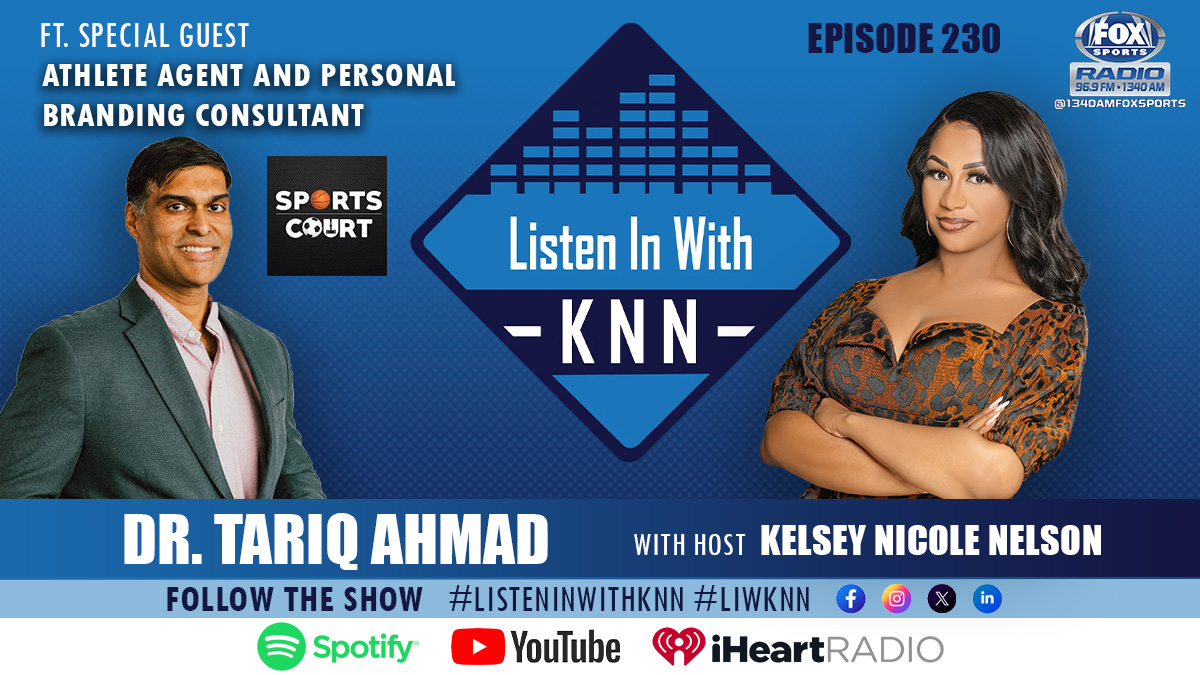On the latest edition of “Listen In With KNN” sports podcast and radio show with host, Kelsey Nicole Nelson, the show focused on NCAA athletics and all things name, image, and likeness with sports marketing agent and NIL educator, Dr. Tariq Ahmad. Ahmad is the founder and CEO of Sports Court Consulting, which focuses on NIL education and athlete representation.
Nelson and Ahmad met earlier in the year at the Inside the NIL: HBCU Educational Summit, held on May 6, at Bowie State University. Ahmad in conjunction with Be Collective+ has been working to bring the NIL summit to HBCUs. The summit is specifically focused on educating students at Historically Black Colleges and Universities.
Giving credit where it’s due, Ahmad first mentioned Antoine Burrell, Founder of B.E. Collective +.
“He’s really the magic behind all of this. His agency specifically focuses on HBCUs.This was really his idea and what he wanted to bring to life,” he said.
To start off, Nelson asked Ahmad how the early summits have gone so far.
“Four summits down, they’ve been great. All of them have been great learning experiences. We’re seeing what’s working, what’s not working, we’re making changes…we’re just looking to make it bigger and better as we go on,” he said.
Nelson, mentioned the over 107 HBCUs and 228,000 students who could potentially benefit from NIL. Nelson asked Ahmad about the team’s strategy for determining which schools to pitch to.
“We don’t wanna use a spray and pray approach. We’re doing one of two things: One, we’re going with a lot of personal connections. Two, we’d like to go back to A&T and Bowie…we saw some great success the first time. Why don’t you bring us back again so we can keep building on it?” he said.
Nelson went on to ask how Ahmad how he ended up working on the summits. Ahmad mentioned his corporate and social media backgrounds, including recent work with Meta (formerly Facebook).
“They had an NIL empower program, so they worked with 30 women college athletes on NIL branding, education, etc. I knew the team there and I was able to get in and work with them on some project management. It really just reenergized my love for working with college athletes,” he said.
After Ahmad’s work at Meta ended, he spent months building up a network of individuals in the NIL space.
“ I just started going to work, writing a newsletter, content for social media, eventually that led to athletes that I represent,” he said.
The two also touched on Ahmad’s work as a college instructor, students seeing viable career paths in the NIL space, and new developments in the NIL. “Rules are changing all the time. I’m in space 40 hours a week and it’s hard for me to keep up,” he said.
Staying on the topic of students, Nelson asked Ahmad why his team specifically works with HBCUs.
“Resources are tight. They have so many other things to deal with, (but) you don’t have to be a power five football player to take advantage of your NIL.”
Nelson went on to mention the recent growth in women’s collegiate sports and how women have begun to take advantage of the NIL space and thrive.
Ahmad added. “It’s way overdue for them—and just to be transparent, women are way better content creators than us guys,” he said.
Keeping on digital content creation, Nelson asked Ahmad about how content creators can best prepare for a possible TikTok ban. He proposed not putting all your eggs in one basket.
“Start building up your Instagram (and) not enough student athletes are on LinkedIn.”
In expanding the NIL conversation to the high school level where NIL is applicable, Nelson asked Ahmad about the viability of high school student-athletes participating in the NIL. Currently two-thirds of states allow them to monetize their NIL. In looking for advice for parents and young athletes themselves, Nelson asked Ahmad, how they can spot legit athlete agents.
“Look at their social media profiles…always try to have a conversation with the person. If you get a bad feeling, no matter how the deal sounds, don’t do it,” he said.
Finishing off, Nelson asked Ahmad about the NIL time limit for athletes who decide to prolong their collegiate careers.
“If you have collegiate athlete eligibility, you can take advantage of NIL,” he said.


